PALOP
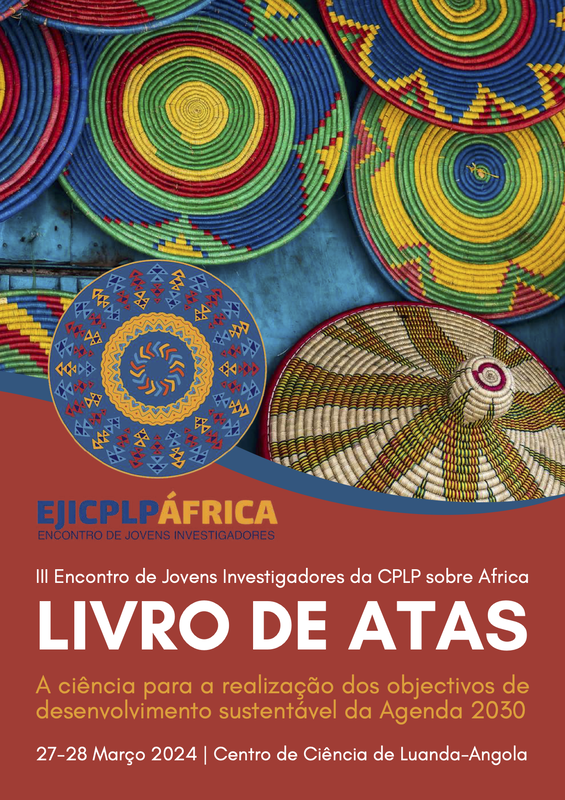
Ebook – 3rd EJICPLP Africa: A ciência para a realização dos Objectivos de Desenvolvimento Sustentável da Agenda 2030
Abstract:
It is with great pleasure that we present the outcomes of the 3rd Meeting of Young Researchers from the CPLP on Africa, held in Luanda on 27 and 28 March 2024. This event, which has already established itself as a key platform for science and development within the Community of Portuguese Language Countries (CPLP), brought together more than 700 participants around the theme “Science for the Achievement of the Sustainable Development Goals of the 2030 Agenda,” fostering a fertile environment for the exchange of ideas, reflections, and collaborations.
With around 30 speakers, including senior researchers, experts, and high-level national and international institutional representatives from various fields of study, eight thematic panels were discussed to deepen knowledge about Africa and its sustainable development, particularly in the areas of Tourism, Energy, Education, Economy, and African Women. The event addressed critical issues related to poverty eradication, environmental protection, and social prosperity. This edition highlighted the role of science in transforming African realities, reflecting on the implementation of the Sustainable Development Goals (SDGs) in the context of the Global South.
The importance of this Meeting goes beyond the impressive number of participants or the lively discussions that marked the two days of activities. The event is a unique scientific forum for young people across the CPLP and brings together a vibrant network of researchers in an itinerant and innovative format. It represents the collective effort of young researchers to give voice to issues that directly affect the development and future of their countries, reinforcing the scientific leadership of CPLP youth.
In this edition, 35 scientific papers by young researchers were presented, selected from among the 65 papers received through the Call for Papers, by a Scientific Committee composed of 30 professors from various universities in CPLP countries.
This book is more than a simple collection of articles; it represents the dedication of young researchers who strive to redefine the role of science in their societies. Through the discussions and analyses presented here, we hope not only to inspire new debates, but also to encourage concrete actions in support of inclusive and sustainable development in CPLP countries.
With the crucial support of the Centre for African and Development Studies (CEsA) and partner organisations such as Angola’s Ministry of Higher Education, Science, Technology and Innovation, and Felcos Umbria, this edition also demonstrates the value of collaboration and international partnerships essential to the success of this project.
We hope these pages offer an enriching perspective on the scientific contributions of Portuguese-speaking youth, as well as concrete actions towards inclusive and sustainable development, particularly in the PALOP countries.
We believe this book marks a milestone on the path towards a more open, collaborative, and transformative science.
Cite this e-book:
D’Abril, Cristina Molares e Jessica Falconi (2024). “III EJICPLP África: A ciência para a realização dos Objectivos de Desenvolvimento Sustentável da Agenda 2030”. ISBN: 978-989-54687-6-8

Entre eu e Deus by Yara Costa: An Unprecedented Representation of the Island of Mozambique
Abstract:
This article aims to dissect the documentary Entre eu e Deus with the primary objective of demonstrating that the director sets out to challenge images, representations and crystallized perceptions of the Island of Mozambique, Mozambican cultural identity and Islamic fundamentalism, and that she succeeds in doing so. The article consists of two main sections. The first provides a brief historical context of the Island of Mozambique and examines some visual representations that predate the documentary under analysis. Here, I pay particular attention to Licínio Azevedo’s documentary on the Island of Mozambique as a relevant antecedent of Yara Costa’s work. The second part provides a detailed analysis of Entre eu e Deus, demonstrating the director’s unprecedented representation of the Island of Mozambique.
Cite this Paper:
Falconi, J. (2024). Entre eu e Deus by Yara Costa: An Unprecedented Representation of the Island of Mozambique. Portuguese Studies 40(2), 175-188. https://dx.doi.org/10.1353/port.00014.
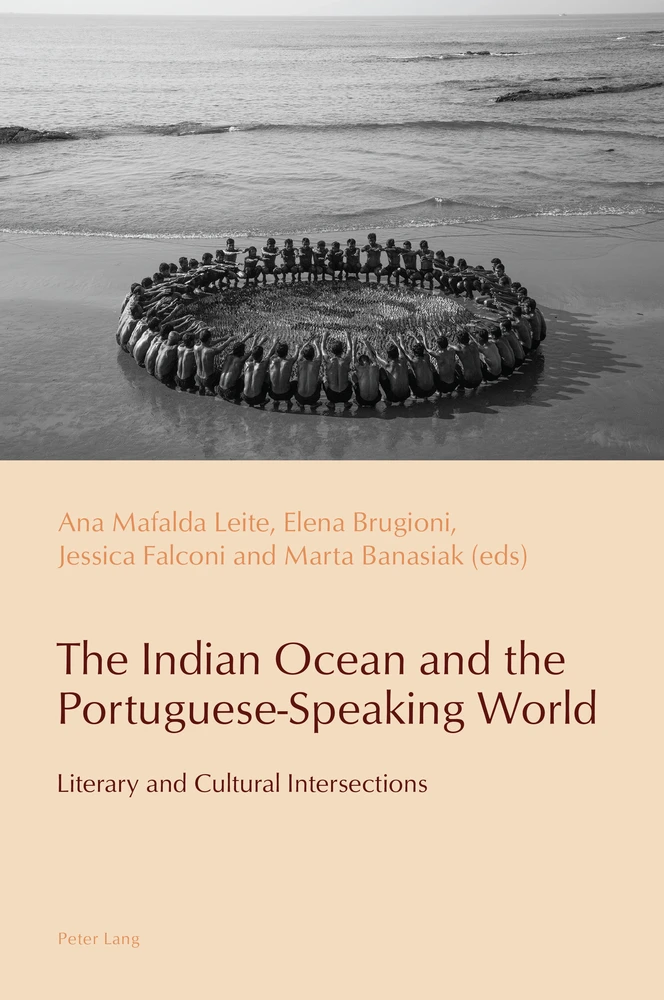
The Indian Ocean and the Portuguese-Speaking World: Literary and Cultural Intersections
Abstract:
Working from the premise that the Indian Ocean shapes new transnational imaginative geographies, this volume analyses how visual and written narratives from Lusophone, or rather «Lusotopic», spaces – Portugal, Mozambique, East Timor and Goa – point to productive critical dialogues with existing theories in Indian Ocean studies. The conceptual and epistemological revision presented in the book allows for the emergence of different theoretical constellations that are not solely based on the opposition between coloniality and the postcolonial condition, nor grounded upon the concept of linguistic or national identity, pointing to a set of original critical developments within the area of Indian Ocean studies.
Cite this book:
Leite, A., M., Brugioni, E., Falconi, J., Banasiak, M. (2025). The Indian Ocean and the Portuguese-Speaking World. Literary and Cultural Intersections. Oxford, United Kingdom: Peter Lang Verlag. Retrieved Dec 13, 2024, from 10.3726/b17729
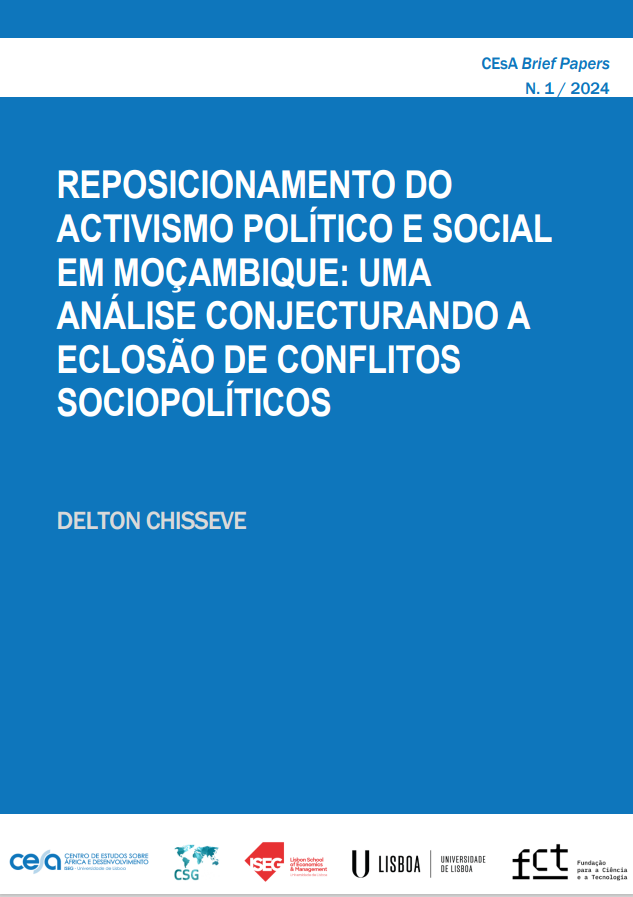
Brief Paper 1/2024: Reposicionamento do activismo político e social em Moçambique: Uma análise conjecturando a eclosão de conflitos sociopolíticos
Abstract:
This Brief Paper discusses the repositioning of political and social activism in Mozambique within a context heavily characterised by the active participation of citizens in the 2023 elections, a stark contrast to previous elections, which were largely marked by weak political and social activism. In this context, the Brief Paper argues that this repositioning is linked to the fact that the Mozambican population has acquired a new political and social awareness, marked by a quest for truth and authenticity in their leaders. This repositioning also reflects the population’s readiness to confront state power and entails two domains of analysis with harmful consequences for the Mozambican government: the domestic domain and the external domain. This occurs because the population increasingly shows a diminished fear of repression carried out by the police and military. Moreover, this repositioning has highlighted the existence of a latent and ongoing conflict between the current Mozambican government and the 1990–2000 generation. Methodologically, two tools supported this analysis: bibliographical techniques and documentary analysis. Theoretically, the Brief Paper is grounded in Maslow’s Basic Needs Theory, combined with the Frustration-Aggression Theory from conflict studies. Finally, the conjectures presented in this Brief Paper suggest that the current Frelimo government has lost legitimacy in the eyes of the people, particularly among the 1990–2000 generation. However, there are also conjectures based on the assumption that Frelimo retains legitimacy through two analytical perspectives: a traditional perspective and an institutional perspective. These two perspectives complement each other and justify Frelimo’s continued hold on power.
Cite this Brief Paper:
Chisseve, Delton (2024). “Reposicionamento do activismo político e social em Moçambique : uma análise conjecturando a eclosão de conflitos sociopolíticos”. CEsA/CGS – Brief Papers nº 1/2024
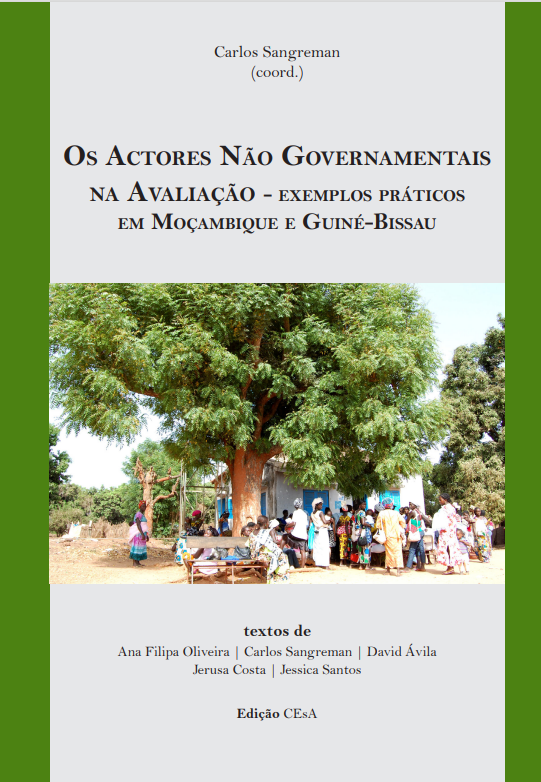
Os Actores Não Governamentais na Avaliação: Exemplos práticos em Moçambique e Guiné-Bissau
Abstract:
This work was conceived with a specific approach: the evaluation of the projects was conducted first, and only after its completion was the idea of publishing a small book on the evaluations considered. Since there was no coordination or dialogue between the “logic of theorization” and the “logic of practice” in the evaluation process intended for the evaluators (something that would undoubtedly have been interesting if done prior to the project evaluations), it was not feasible for the publication to revise certain aspects of the evaluations to systematically incorporate the international debate on the methodologies employed.
The book begins with an introductory section featuring a first chapter by Ana Filipa Oliveira, who provides a historical overview of ideas on evaluation and its institutionalization by various cooperation funders. In the second chapter, Jessica Santos analyses foundations as actors in the field of cooperation, drawing on her master’s research.
The second part contains a chapter by David Ávila, evaluating the “Tree of Hope” project in Maputo Province, specifically in the town of Namaacha in the area of agricultural production, which includes a significant research component, as well as the “Point by Point with Health” project in Inhambane. Jerusa Costa authors the following chapter, where she evaluates a set of projects supported by the Calouste Gulbenkian Foundation in the area of health in Guinea-Bissau. This chapter concludes with a response from ACEP to Jerusa Santos’s evaluation of the project “Women and Development: Self-employment and Self-confidence.”
Finally, Carlos Sangreman writes the conclusions and recommendations, proposing the effective institutionalisation of evaluation in the context of non-governmental cooperation through the implementation of a pilot certification project.
Cite this book:
Sangreman, Carlos (Coordenação) .(2014). Os actores não governamentais na avaliação : exemplos práticos em Moçambique e Guiné-Bissau. Edição CEsA. Apoio Fundação Calouste Gulbenkian. 2014
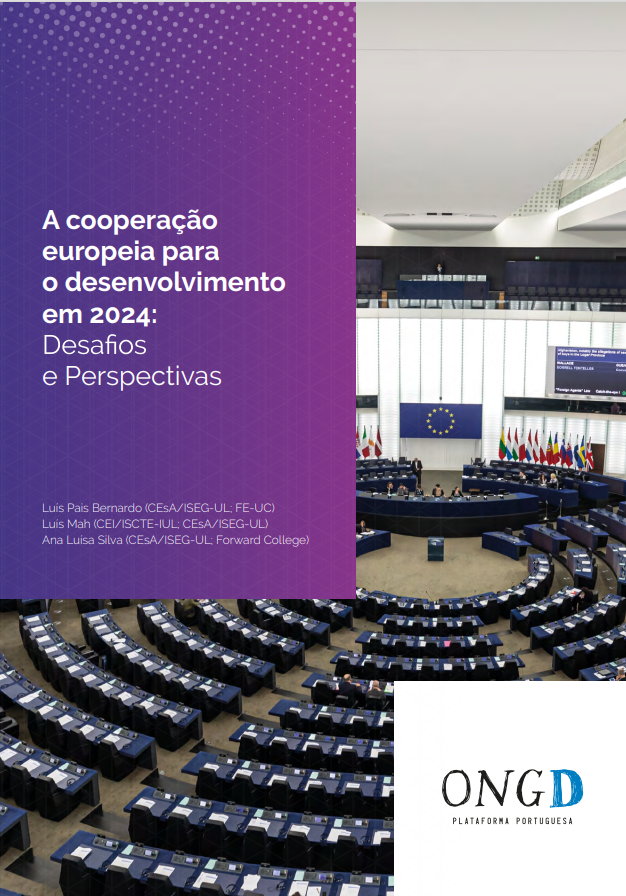
A Cooperação Europeia para o Desenvolvimento em 2024: Desafios e perspectivas
Abstract:
In a year of European Parliament (EP) elections, and amid growing global uncertainty, the study “European Development Cooperation in 2024: Challenges and Perspectives” was created following the publication “The Future of International Development Cooperation: Fragmentation, Adaptation, and Innovation in a Changing World” (2021). In this study, we outline the latest developments in the European Union’s (EU) international development cooperation (IDC) at the institutional and policy levels, highlighting the role of the European Parliament. We also examine the relationship between Portuguese IDC and its European counterpart, emphasizing the centrality of partner countries in the Portuguese-Speaking African Countries and Timor-Leste (PALOP-TL) and the role of civil society. We conclude with reflections on the implications for European cooperation, Portuguese cooperation, and civil society given the increasing importance of geopolitics in the current global context, the political-institutional transformations observed in European IDC, and the likely configuration of the EP for the new legislature, where it is expected that political forces opposing development cooperation will be strengthened.
Cite this ebook:
Bernardo, Luís Pais, Luís Mah e Ana Luísa Silva (2024). A cooperação europeia para o desenvolvimento em 2024 : desafios e perspectivas. Lisboa: Plataforma Portuguesa das ONGD
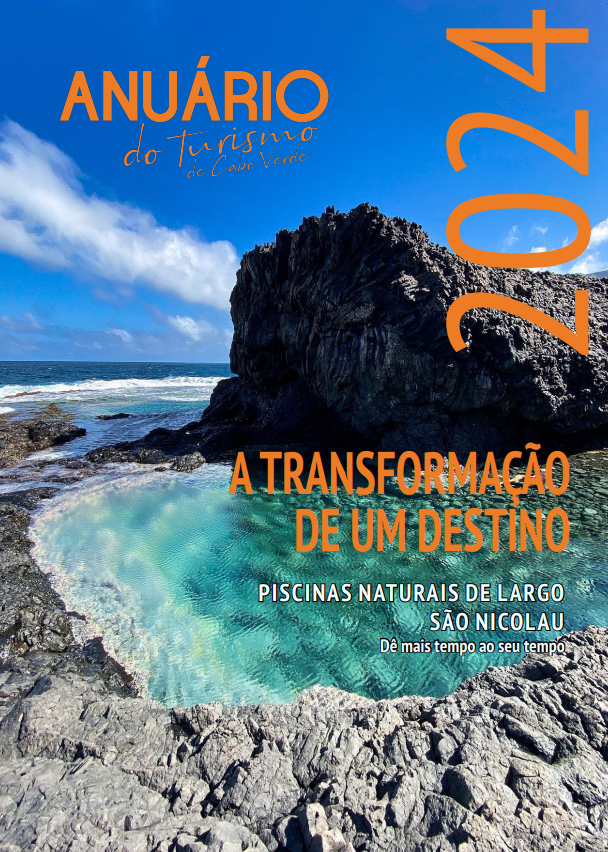
Turismo Costeiro e Marítimo em Cabo Verde. Rumo a um destino sustentável
Cite this paper:
Sarmento, E. (2024). Turismo costeiro e marítimo em Cabo Verde. Rumo a um destino sustentável. In Morgado, Carlos (2024). Anuário do Turismo de Cabo Verde 2024: a transformação de um destino (pp.30-32). Praia, Cabo Verde.
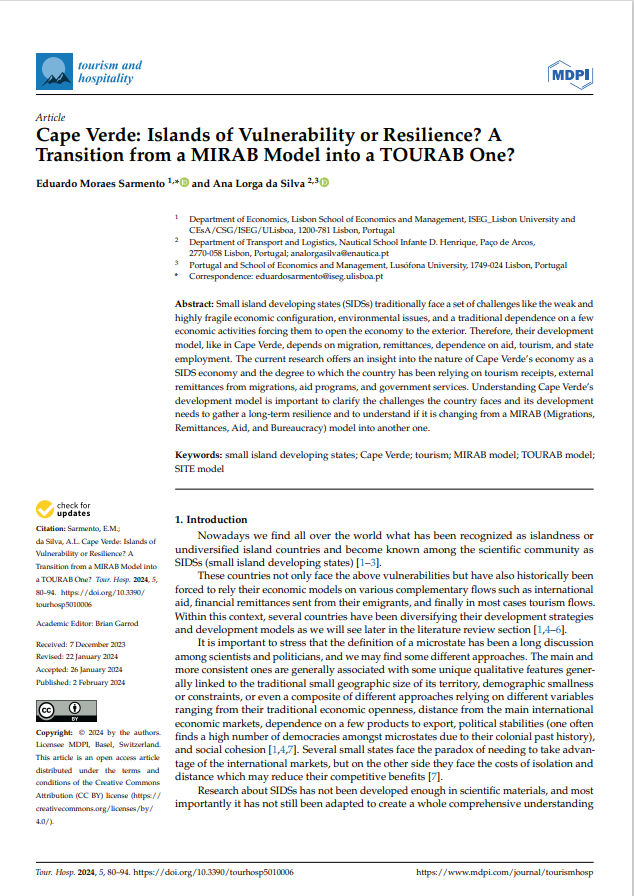
Cape Verde: Islands of vulnerability or resilience? A transition from a MIRAB Model into a TOURAB one?
Abstract:
Small island developing states (SIDSs) traditionally face a set of challenges like the weak and highly fragile economic configuration, environmental issues, and a traditional dependence on a few economic activities forcing them to open the economy to the exterior. Therefore, their development model, like in Cape Verde, depends on migration, remittances, dependence on aid, tourism, and state employment. The current research offers an insight into the nature of Cape Verde’s economy as a SIDS economy and the degree to which the country has been relying on tourism receipts, external remittances from migrations, aid programs, and government services. Understanding Cape Verde’s development model is important to clarify the challenges the country faces and its development needs to gather a long-term resilience and to understand if it is changing from a MIRAB (Migrations, Remittances, Aid, and Bureaucracy) model into another one.
Cite this article:
Sarmento, E.; Silva, Ana (2024). Cape Verde: Islands of Vulnerability or Resilience? A Transition from a MIRAB Model into a TOURAB One? Tour. Hosp. 2024, 5(1), 80-94; https://doi.org/10.3390/tourhosp5010006. MDPI. Special Edition Submit to Special Issue: Small Island Developing Countries (SIDS): Tourism between Innovation and Authenticity for Better Sustainable Developing Paths
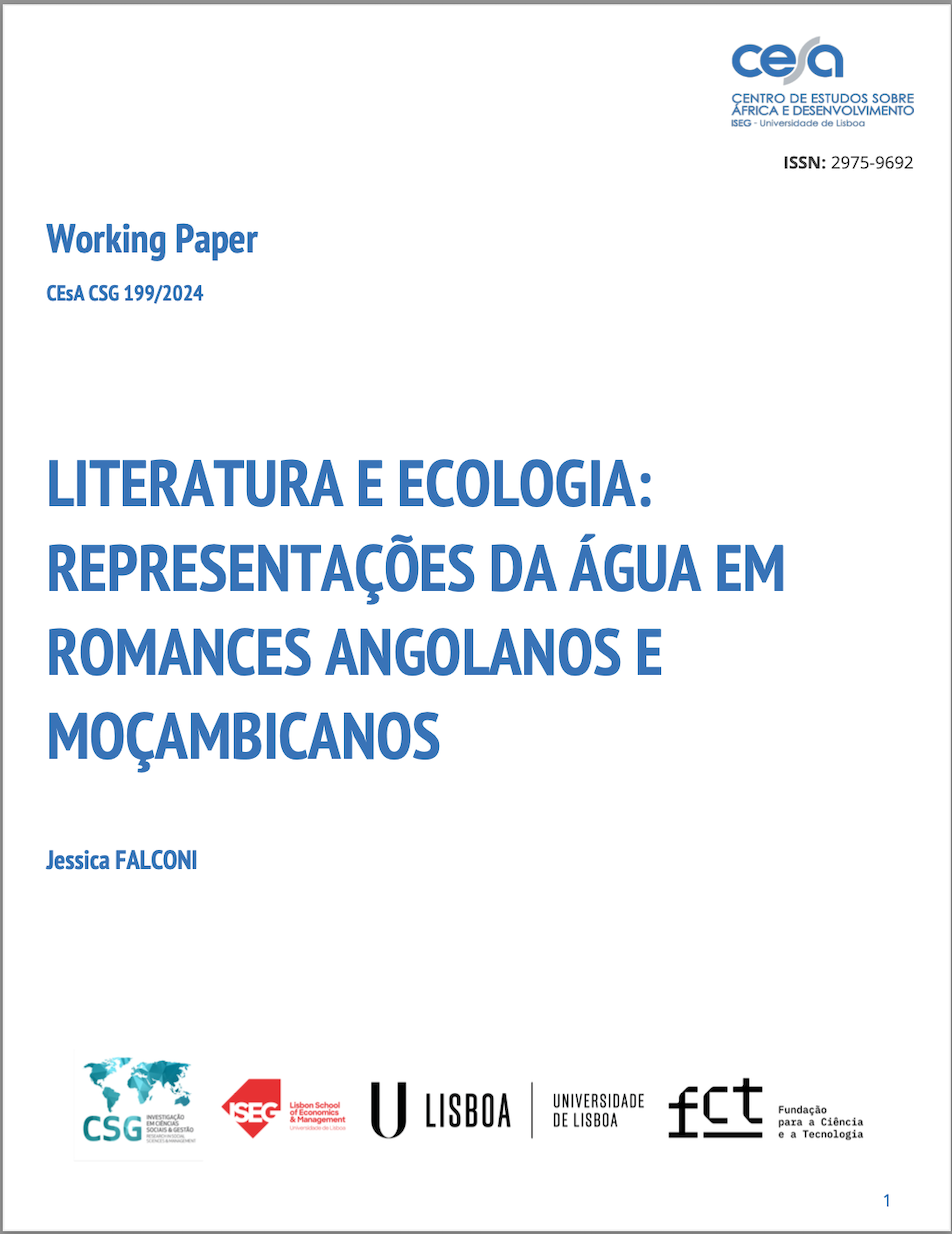
Working Paper 199/2024: Literatura e Ecologia: Representações da água em romances angolanos e moçambicanos
Abstract:
This article offers a brief cartography of the narrative role of water in Angolan and Mozambican literature, through a comparative reading of four novels: O desejo de Kianda (1995) by the Angolan Pepetela; De Rios Velhos e Guerrilheiros. I. O Livro dos Rios (2006) by Luandino Vieira; Água. Uma novela rural (2016) and Ponta Gea (2017) both by the Mozambican João Paulo Borges Coelho.
The introduction places the proposed cartography within the framework of ecocritical studies, whose various paradigms offer useful tools and concepts for reading the selected literary works. The thematic and comparative methodological approach highlights experiences and imaginaries common to two post-colonial contexts, despite the difference in scenarios, themes, aesthetic choices and narrative strategies. The analysis aims to demonstrate that water is a crucial element in narrating post-colonial Angolan and Mozambican societies.
Cite this Working Paper:
Falconi, Jessica (2024). “Literatura e Ecologia: Representações da água em romances angolanos e moçambicanos”. CEsA/CGS – Documentos de trabalho nº 199/2024
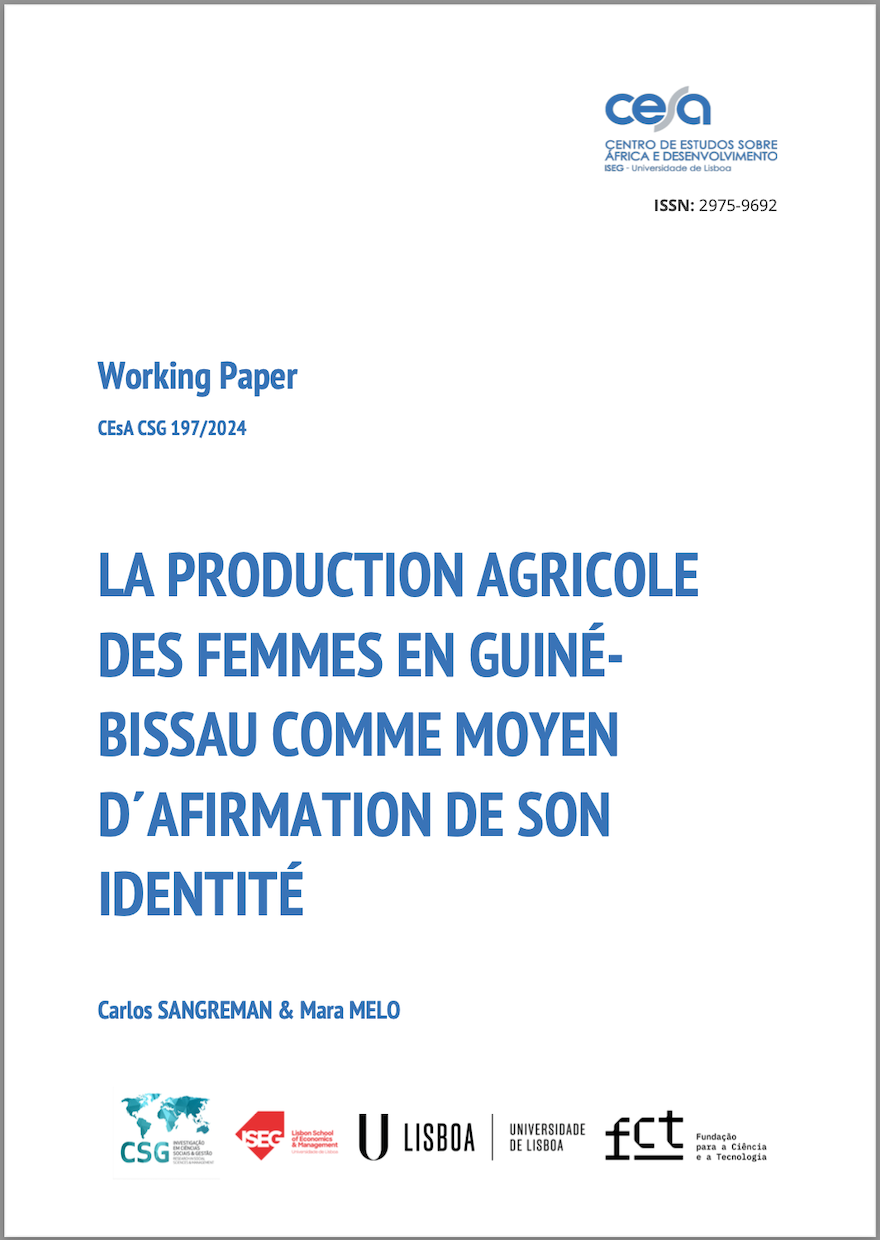
Working Paper 197/2024: La Production Agricole des Femmes en Guiné-Bissau comme Moyen d´Afirmation de son Identité
Abstract:
This working paper is an intermediate product of the study done for Swiss Cooperation in Guinea-Bissau, written in French without any point in Portuguese. What we demonstrate, as well as the principles of restitution and appropriation by the persons or institutions that access to respond to surveys or interviews, are words that do not translate into concrete actions for this Cooperation. The data were obtained by surveys and interviews in the regions of Bissau, Biombo, Bafatá, and Oio, with the producers (which also include a limited number of male producers) of leguminous agricultural products, in a sample of 160 people chosen at random. At the option of the promoter, the study focused on the marketing of products and not on production. To better understand the results, it must be said that this business model is not very profitable, but it is an activity that gives a greater independence of women in relation to men in the family space, since decisions about the use of profits belong to the producers. It also has a potential environment of action for the affirmation of the social (and not just family) identity of women that should not be despised although, as far as we can see, this is expressed for now only in the organization of associations of producers.
Cite this Working Paper:
Sangreman, C. e Melo, M. (2024). “La Production Agricole Des Femmes En Guiné-Bissau Comme Moyen D´Afirmation De Son Identité”. Instituto Superior de Economia e Gestão – CEsA/CGS – Documentos de trabalho nº 197/2024





